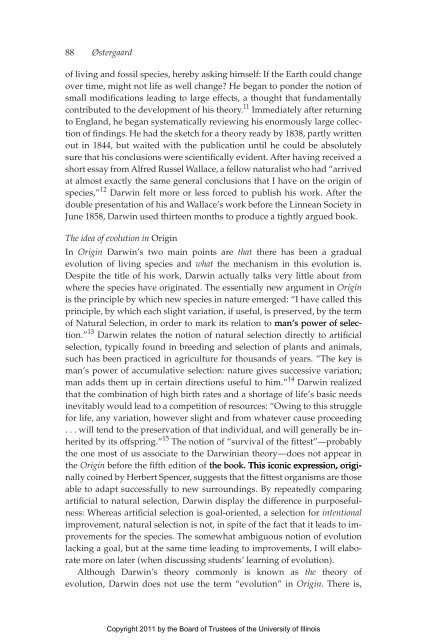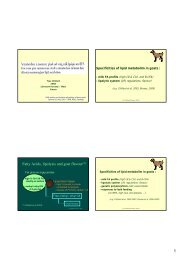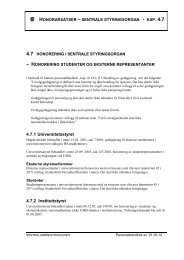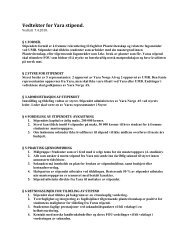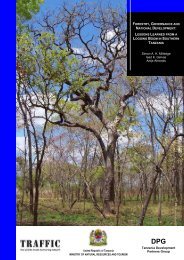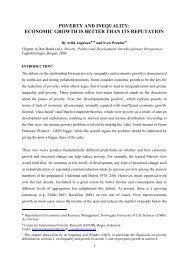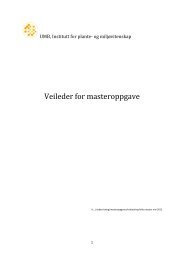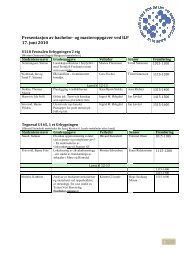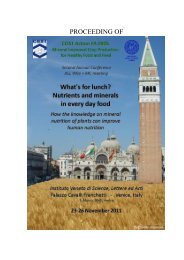Darwin and Wagner: Evolution and Aesthetic Appreciation - UMB
Darwin and Wagner: Evolution and Aesthetic Appreciation - UMB
Darwin and Wagner: Evolution and Aesthetic Appreciation - UMB
Create successful ePaper yourself
Turn your PDF publications into a flip-book with our unique Google optimized e-Paper software.
88 Østergaard<br />
of living <strong>and</strong> fossil species, hereby asking himself: If the Earth could change<br />
over time, might not life as well change? He began to ponder the notion of<br />
small modifications leading to large effects, a thought that fundamentally<br />
contributed to the development of his theory. 11 Immediately after returning<br />
to Engl<strong>and</strong>, he began systematically reviewing his enormously large collection<br />
of findings. He had the sketch for a theory ready by 1838, partly written<br />
out in 1844, but waited with the publication until he could be absolutely<br />
sure that his conclusions were scientifically evident. After having received a<br />
short essay from Alfred Russel Wallace, a fellow naturalist who had “arrived<br />
at almost exactly the same general conclusions that I have on the origin of<br />
species,” 12 <strong>Darwin</strong> felt more or less forced to publish his work. After the<br />
double presentation of his <strong>and</strong> Wallace’s work before the Linnean Society in<br />
June 1858, <strong>Darwin</strong> used thirteen months to produce a tightly argued book.<br />
The idea of evolution in Origin<br />
In Origin <strong>Darwin</strong>’s two main points are that there has been a gradual<br />
evolution of living species <strong>and</strong> what the mechanism in this evolution is.<br />
Despite the title of his work, <strong>Darwin</strong> actually talks very little about from<br />
where the species have originated. The essentially new argument in Origin<br />
is the principle by which new species in nature emerged: “I have called this<br />
principle, by which each slight variation, if useful, is preserved, by the term<br />
of Natural Selection, in order to mark its relation to man’s power of selection.”<br />
13 <strong>Darwin</strong> relates the notion of natural selection directly to artificial<br />
selection, typically found in breeding <strong>and</strong> selection of plants <strong>and</strong> animals,<br />
such has been practiced in agriculture for thous<strong>and</strong>s of years. “The key is<br />
man’s power of accumulative selection: nature gives successive variation;<br />
man adds them up in certain directions useful to him.” 14 <strong>Darwin</strong> realized<br />
that the combination of high birth rates <strong>and</strong> a shortage of life’s basic needs<br />
inevitably would lead to a competition of resources: “Owing to this struggle<br />
for life, any variation, however slight <strong>and</strong> from whatever cause proceeding<br />
. . . will tend to the preservation of that individual, <strong>and</strong> will generally be inherited<br />
by its offspring.” 15 The notion of “survival of the fittest”—probably<br />
the one most of us associate to the <strong>Darwin</strong>ian theory—does not appear in<br />
the Origin before the fifth edition of the book. This iconic expression, originally<br />
coined by Herbert Spencer, suggests that the fittest organisms are those<br />
able to adapt successfully to new surroundings. By repeatedly comparing<br />
artificial to natural selection, <strong>Darwin</strong> display the difference in purposefulness:<br />
Whereas artificial selection is goal-oriented, a selection for intentional<br />
improvement, natural selection is not, in spite of the fact that it leads to improvements<br />
for the species. The somewhat ambiguous notion of evolution<br />
lacking a goal, but at the same time leading to improvements, I will elaborate<br />
more on later (when discussing students’ learning of evolution).<br />
Although <strong>Darwin</strong>’s theory commonly is known as the theory of<br />
evolution, <strong>Darwin</strong> does not use the term “evolution” in Origin. There is,<br />
Copyright 2011 by the Board of Trustees of the University of Illinois


